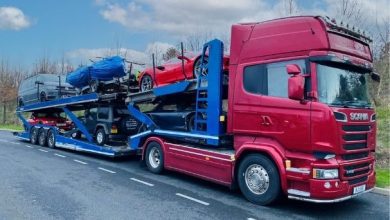Truck Leasing: A Smart Choice for Business Owners

For many businesses in the transportation and logistics industry, truck leasing presents a flexible and cost-effective solution to acquiring and maintaining a fleet. Whether you’re an owner-operator or running a larger trucking company, leasing a truck offers numerous advantages over purchasing one outright. In this blog, we will explore the benefits of truck leasing, the different types of truck leases, and how to make the best decision for your business.
What is Truck Leasing?
Truck leasing is a financial agreement where a business rents a truck from a leasing company for a specified period, usually with the option to purchase at the end of the lease term. During the lease term, the business makes monthly payments, and at the end of the agreement, the truck may be returned, purchased, or upgraded to a newer model.
Leasing a truck provides businesses with the ability to access high-quality equipment without needing to commit to large upfront costs associated with buying. This allows businesses to maintain cash flow while also ensuring that they have access to reliable and well-maintained vehicles.
Benefits of Truck LeasingLower Upfront Costs
One of the most significant advantages of truck leasing is the lower upfront cost compared to purchasing. Rather than paying for the entire vehicle in one lump sum, truck leasing allows businesses to make manageable monthly payments. This can free up valuable capital for other business expenses, such as paying employees, purchasing fuel, or expanding operations.
Flexibility in Upgrading Your Fleet
Truck leasing gives businesses the opportunity to upgrade their fleet regularly without the burden of selling old trucks or dealing with depreciation. At the end of a lease term, businesses can choose to lease a newer model with the latest technology and better fuel efficiency. This keeps your fleet competitive, improves operations, and reduces downtime associated with older, worn-out trucks.
No Maintenance Costs
Many truck leasing agreements include maintenance packages that cover routine services and repairs. This can be a huge benefit for businesses that need to focus on operations rather than managing maintenance schedules or paying for repairs. With a lease, businesses often pay for the truck’s maintenance, including tires, oil changes, and other routine services, which can help avoid unexpected expenses.
Improved Cash Flow
Leasing a truck rather than buying one helps businesses keep their cash flow intact. Instead of draining funds to make a large purchase, leasing offers more predictable monthly expenses. This allows businesses to maintain liquidity and be better prepared to handle seasonal fluctuations, unexpected expenses, or take advantage of new business opportunities.
Tax Benefits
Truck leasing can offer potential tax benefits for businesses. Lease payments may be deductible as operating expenses on your taxes, which could lower your overall tax burden. Since businesses that lease trucks typically treat them as operational costs, these deductions can be valuable in reducing your taxable income. It’s always advisable to consult with a tax professional to ensure that you maximize the potential tax advantages.
Types of Truck Leases
There are primarily two types of truck leases available: operating leases and finance leases. Both offer distinct benefits, and the right choice will depend on your business’s needs.
Operating Lease
An operating lease is the most common type of lease for businesses that want to lease a truck for a short term (typically 2-5 years). Under this agreement, the business rents the truck and returns it at the end of the lease term. Monthly payments are typically lower compared to a finance lease, and the lease term is shorter, providing more flexibility.
Operating leases are ideal for businesses that prefer not to own the truck outright or are looking to upgrade their fleet regularly. Since the business does not own the truck, there is usually no residual value or purchase option at the end of the lease. Businesses are not responsible for the truck’s depreciation, and the risk of value loss lies with the leasing company.
Finance Lease
A finance lease is similar to a hire purchase agreement and is generally suited for businesses that want the option to own the truck at the end of the lease term. The terms of a finance lease often mirror the terms of a loan, with monthly payments higher than an operating lease but with the option to purchase the truck at the end of the lease for a residual value.
This type of lease is ideal for businesses that plan to keep the truck for a long time and eventually own it outright. It is also beneficial for businesses that want to spread the cost of the truck over several years while still maintaining the ability to own the vehicle at the end of the agreement.
How to Choose the Right Truck Lease for Your Business
1. Evaluate Your Business Needs
Before entering a truck lease agreement, evaluate your business’s specific needs. How often do you need to upgrade your fleet? Do you prefer having new trucks with the latest technology? If your business benefits from having the newest trucks in your fleet, an operating lease may be the best option. If you’re looking for long-term ownership and don’t plan on upgrading frequently, a finance lease may be more suitable.
2. Consider Your Budget and Cash Flow
Your current cash flow is another important factor when deciding between leasing and buying. A finance lease may require higher monthly payments but ultimately allows you to own the truck. On the other hand, an operating lease provides lower monthly payments but doesn’t allow you to own the truck at the end of the term. Consider what works best with your cash flow and future business plans.
3. Account for Maintenance Costs
If you’re concerned about unexpected maintenance and repair costs, consider leasing a truck with a maintenance package. This could be a major factor in saving money and managing operational costs over the life of the lease. An operating lease with a maintenance plan can be particularly beneficial for truckers looking for peace of mind regarding repair expenses.
4. Understand Tax Implications
Leasing a truck can have tax advantages, but it’s important to understand the tax implications for your business. Lease payments may be deductible as business expenses, but the specific tax treatment will depend on the structure of the lease. Consulting with a tax advisor or accountant can ensure that you’re taking full advantage of any potential tax deductions and maximizing your savings.
5. Review Lease Terms and Conditions
Carefully review the terms and conditions of any truck lease before signing. Pay attention to the lease duration, payment schedule, end-of-lease options, and any additional fees (such as mileage restrictions, wear-and-tear penalties, or early termination fees). Knowing these details will help you avoid surprises down the road and ensure that the lease fits within your business’s operational strategy.
Conclusion: Is Truck Leasing Right for Your Business?
Truck leasing offers numerous benefits to trucking businesses, from lower upfront costs and improved cash flow to the ability to upgrade your fleet regularly. Whether you choose an operating lease or a finance lease depends on your business’s specific needs, financial situation, and long-term goals.
Leasing is an ideal option for businesses that want to reduce capital expenditures, preserve working capital, and maintain a reliable fleet without the responsibilities of ownership. By understanding the different types of leases available and evaluating your business’s financial position, you can make an informed decision that enhances the growth and efficiency of your trucking operations.
If you’re considering truck leasing for your business, take the time to explore your options, compare offers, and choose a lease agreement that aligns with your business strategy and financial goals. With the right truck lease in place, your business can thrive with minimal risk and maximum operational efficiency.






